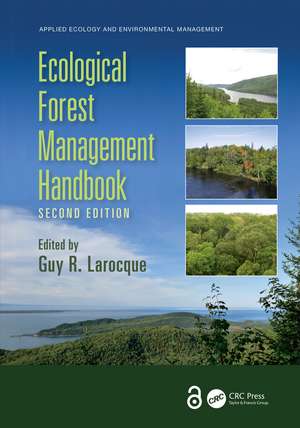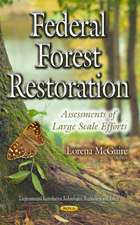Ecological Forest Management Handbook: Applied Ecology and Environmental Management
Editat de Guy R. Larocqueen Limba Engleză Hardback – 21 aug 2024
NEW IN THE SECOND EDITION
- Provides a comprehensive collection of sustainable forest management principles and their applications
- Covers new ecological indicators that can be applied to address forest environmental issues
- Includes all types of models: empirical, gap, and process-based models
- Explains several basic ecological and management concepts in a clear, easy-to- understand manner
Chapter 18 of this book is available for free in PDF format as Open Access from the individual product page at www.taylorfrancis.com. It has been made available under a Creative Commons Attribution-NonCommercial-NoDerivatives 4.0 license.
| Toate formatele și edițiile | Preț | Express |
|---|---|---|
| Hardback (2) | 1299.23 lei 6-8 săpt. | |
| CRC Press – 23 dec 2015 | 1411.44 lei 3-5 săpt. | |
| CRC Press – 21 aug 2024 | 1299.23 lei 6-8 săpt. |
Din seria Applied Ecology and Environmental Management
- 15%
 Preț: 594.30 lei
Preț: 594.30 lei - 15%
 Preț: 461.03 lei
Preț: 461.03 lei - 22%
 Preț: 329.91 lei
Preț: 329.91 lei -
 Preț: 445.99 lei
Preț: 445.99 lei - 15%
 Preț: 445.21 lei
Preț: 445.21 lei - 12%
 Preț: 343.91 lei
Preț: 343.91 lei - 13%
 Preț: 297.05 lei
Preț: 297.05 lei - 25%
 Preț: 3753.12 lei
Preț: 3753.12 lei - 15%
 Preț: 508.23 lei
Preț: 508.23 lei - 13%
 Preț: 315.29 lei
Preț: 315.29 lei - 15%
 Preț: 585.27 lei
Preț: 585.27 lei -
 Preț: 471.47 lei
Preț: 471.47 lei -
 Preț: 436.14 lei
Preț: 436.14 lei - 18%
 Preț: 1120.23 lei
Preț: 1120.23 lei - 15%
 Preț: 697.38 lei
Preț: 697.38 lei
Preț: 1299.23 lei
Preț vechi: 1584.43 lei
-18% Nou
Puncte Express: 1949
Preț estimativ în valută:
248.64€ • 269.98$ • 208.86£
248.64€ • 269.98$ • 208.86£
Carte tipărită la comandă
Livrare economică 22 aprilie-06 mai
Preluare comenzi: 021 569.72.76
Specificații
ISBN-13: 9781032555171
ISBN-10: 1032555173
Pagini: 584
Ilustrații: 256
Dimensiuni: 178 x 254 mm
Greutate: 1.22 kg
Ediția:2
Editura: CRC Press
Colecția CRC Press
Seria Applied Ecology and Environmental Management
Locul publicării:Boca Raton, United States
ISBN-10: 1032555173
Pagini: 584
Ilustrații: 256
Dimensiuni: 178 x 254 mm
Greutate: 1.22 kg
Ediția:2
Editura: CRC Press
Colecția CRC Press
Seria Applied Ecology and Environmental Management
Locul publicării:Boca Raton, United States
Public țintă
Academic, Professional Reference, and Undergraduate AdvancedNotă biografică
Guy R. Larocque, PhD, is a research scientist for the Canadian Forest Service, a sector of Natural Resources Canada, at the Laurentian Forestry Centre, Quebec City, Quebec, Canada. He is also an adjunct professor in the Faculty of Natural Resources Management at Lakehead University (Thunder Bay, Ontario, Canada). Dr. Larocque is Associate Editor of Ecoscience. Until recently, he served on the editorial board of Ecological Modelling. He has published papers on productivity and succession, carbon cycles, uncertainty analysis, and the development of empirical, succession (gap), and process-based models for forest ecosystems and was Guest Editor of special issues in Ecological Modelling, Écoscience and Forests.
Recenzii
The Second Edition of the Ecological Forest Management Handbook builds nicely off the First Edition and is an indispensable guide that navigates the complex terrain of sustainable forestry with clarity and depth. This book not only elucidates the foundational principles of ecological forest management, but also integrates them seamlessly with practical applications and contemporary challenges. From the intricacies of forest ecosystem dynamics to the nuanced discussions on wildlife ecology, management systems, and ecosystem services, each chapter offers a comprehensive exploration enriched by diverse perspectives. What sets this book apart is its holistic approach, which considers ecological, social, and economic dimensions of forest management, ensuring a balanced view essential for today's environmental stewardship. With its extensive references and clear exposition, the Ecological Forest Management Handbook is an invaluable resource for anyone engaged in forestry education, research, or policy, providing theoretical insights and actionable strategies for sustainable forest practices.
Prof. Aaron Weiskittel, School of Forest Resources, University of Maine, Orono, ME, USA
Prof. Aaron Weiskittel, School of Forest Resources, University of Maine, Orono, ME, USA
Cuprins
Section I: Forest Management Concepts. 1. Ecological Forestry Derived from Knowledge on Natural Disturbances. 2. Triad Forest Management: Local Fix or Global Solution? 3. Forest Wildlife Management. 4. External Drivers of Changes Challenging Forestry: Political and Social Issues at Stake. 5. Ecosystem Services in Ecological Forest Management. Section II: Forest Models. 6. Growth and Yield Models for Predicting Tree and Stand Productivity. 7. Forest Succession Models. 8. Process-Based Models: A Synthesis of Models and Applications to Address Environmental and Management Issues. 9. Modeling Forest Carbon Budgets toward Ecological Forest Management: Challenges and Future Directions. 10. Modeling the Impacts of Pest Damage: Case Studies for Conifers in British Columbia, Canada. Section III: Ecological Indicators. 11. Assessing Abundance, Biomass, and Complexity in the Context of Ecological Forest Management. 12. Considering Forest Biodiversity Indicators within the Pressure, State, Benefits, and Response Framework. 13. Indicators of Forest Ecosystem Integrity. 14. Criteria and Indicators of Sustainable Forest Management. 15. Indicating Forest Ecosystem and Stand Productivity: From Deductive to Inductive Concepts. 16. Modeling Forest Floor Biomass and N Accumulations and Related Turnover Rates. 17. Forest Ecosystem Health and Biotic Disturbances: Perspectives on Indicators and Management Approaches. Section IV: Addressing Ecological and Socioeconomic Issues. 18. Application of Surface Modeling for Large Regions: A Case Study for Forest Carbon Stocks in China. 19. Comprehensive Analysis of Land Tenure Effects on the Structure and Services of Regional Forest Ecosystems. 20. Forest Management and Climate Change: Adaptive Measures for the Temperate–Boreal Interface of Eastern North America.
Descriere
This new edition of the Ecological Forest Management Handbook provides readers with basic principles of forest management and their applications at regional and site-specific levels. Updated and revised, it addresses numerous topics and includes new studies on ecological indicators, the carbos cycle, and ecosystem simulation models.








